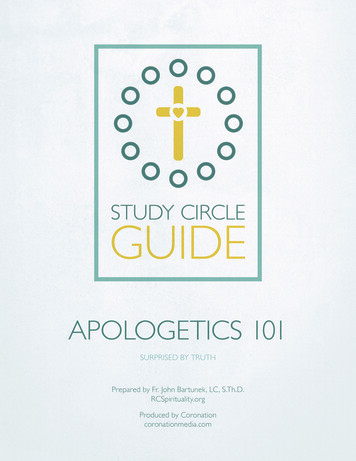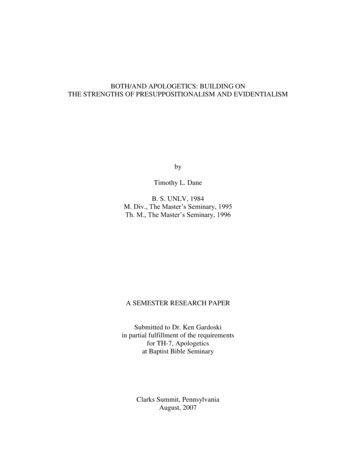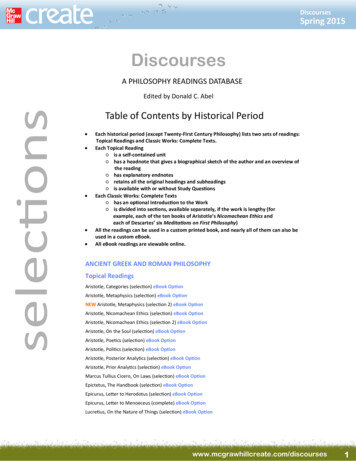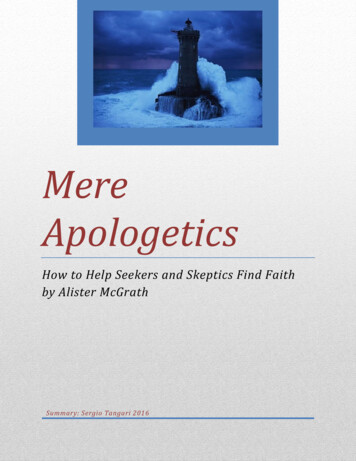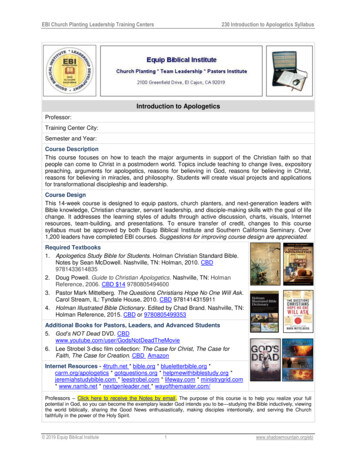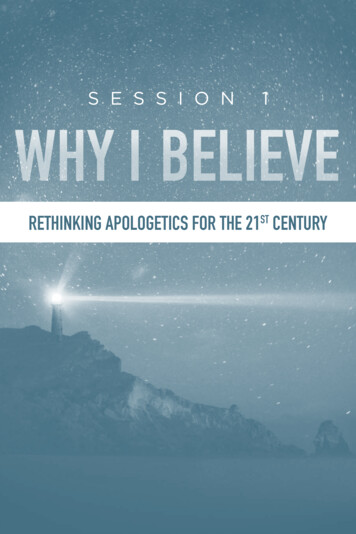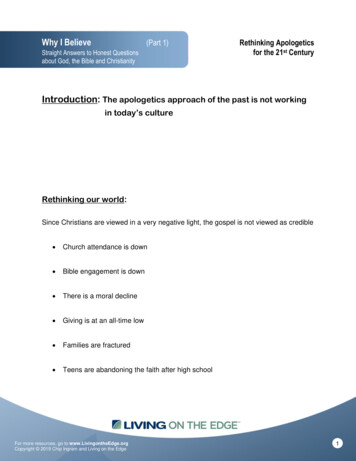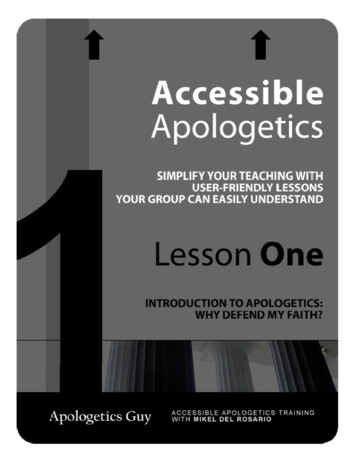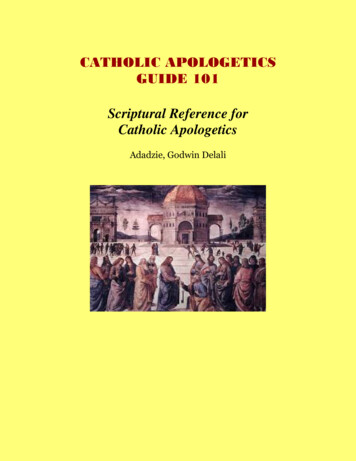
Transcription
CATHOLIC APOLOGETICSGUIDE 101Scriptural Reference forCatholic ApologeticsAdadzie, Godwin Delali
CATHOLIC APOLOGETICS GUIDE 101CATHOLIC APOLOGETICSGUIDE 101Scriptural Reference forCatholic ApologeticsAdadzie, Godwin DelaliPermission is hereby granted by the author to print,copy or distribute anything in this book, providedthat all contents remain intact and credit is givento the author where necessary.Send all comments to: godwindelali@yahoo.comor visit: http://www.amen.co.nrCopyright 2007-2009Sts. Peter and Paul Catechism Ministry – GhanaAll rights reserved.II
CATHOLIC APOLOGETICS GUIDE 101PREFACEThis is a little book for those seeking a right understanding of Apologetics in the contextof Catholicism. It is written in a simple and friendly manner. It is an attempt to look atsome Catholic positions in a Biblical perspective. It is hoped that this book should appealto the Catholic as well as to the non-Catholic readers. It is not written in a "scholarly"way, but as a plain "theological" statement with the hope of carrying conviction.This book does not pretend to be exhaustive. The field which it covers is too vast to admitof minute analysis. A good number of Catholics leave the Church every year due to poorunderstanding of the Faith and also the efforts of anti-Catholic groups and churches.Realizing that misrepresentation and misunderstanding are the chief sources of error; thisbook serves as a quick guide to remove some of these errors.Many thanks to all those who have made this book a success, especially The BlessedTrinity in Unity and Our Lady of Mercy. This book is also highly indebted to CatholicApologists Mark Bonocore, Patrick Madrid, Steve Ray, Dave Armstrong, John Salza,John Pacheco, Dr. Art Sippo, Dr. Scott Hahn, Tim Staples, Mark Shea and JohnMartignoni among others.The works and/or influence of the following faithful shepherds and teachers were of greatbenefit to this material: Archbishop Fulton J. Sheen (of blessed memory), Fr. Martin J.Scott, S.J. (of blessed memory), Fr. Mitchell Pacwa S.J. (USA), Fr. Francis Peffley(USA), Fr. John Kobina Louis (Ghana) and all the past and present priests of the nobleSt. Joseph the Worker Catholic Church in Community 8 Tema, Ghana, West Africa.Some versions of Sacred Scripture used in this book include:1. American Standard Version – ASV2. Douay-Rheims Bible - DRB3. Good News Bible – GNB4. King James Version – KJV5. Revised Standard Version – RSV6. Revised Version – RVIII
CATHOLIC APOLOGETICS GUIDE 101TABLE OF CONTENTSPREFACE . IIIINTRODUCTION . - 1 Sola Fide (Faith alone) . - 3 Salvation & Justification . - 7 Sola Scriptura (Bible Alone) . - 14 Baptism . - 19 Holy Eucharist . - 22 Confirmation . - 25 Penance (Confession). - 26 Purgatory . - 30 Petrine Ministry (Papacy) . - 34 Mother Mary (Mariology). - 40 Mother Mary and the Saints . - 47 Adoration and Honour . - 52 Perpetual virginity of Mother Mary . - 58 Anti-Catholic Polemics and Bigotry . - 67 The Catholic Concordance . - 70 Bibliography: . - 92 -IV
CATHOLIC APOLOGETICS GUIDE 101INTRODUCTIONUsually people object to the Catholic Faith based on Scriptural grounds. They claim theteachings of the Catholic Church are contrary to the clear teachings of the Bible, andthese misrepresentations have led countless souls out of the Church. However, Scriptureread in context fully supports Catholic teachings.“The Christianity of history is not Protestantism . To be deep in history is to cease to bea Protestant.” (John Henry Cardinal Newman, Catholic Convert)“I would not believe in the Gospel, had not the authority of the Catholic Church alreadymoved me.” (St. Augustine of Hippo)“If you undermine the Catholic Church, you undermine the Bible!” (Anonymous)What is Apologetics? Apologetics is a branch of Theology. It comes from an ancientGreek word πολογία (apologia) which literally means an apology. An apology (anancient sense of the word) meaning to make a reasoned defense or justification ofsomething. In the New Testament the word apologia is found at many places such as Act22:1, 1 Peter 3:15 etc."In your hearts reverence Christ as Lord. Always be prepared to make a defense to anyone who calls you to account for the hope that is in you, yet do it with gentleness andreverence. " (1 Peter 3:15, RSV)Apologetics is all about knowing why we do what we do and believe what we believe. Itis building the case for our Faith, learning how to explain and defend our Faith withconfidence and ease.Apologetics is an important part of the Church's work. In Jude 3 we are told to "Contendfor the faith, which was once for all delivered to the saints."To my Catholic Brothers and Sisters:We should always remember these facts:1. The Bible is a Catholic book!2. The One Holy Catholic and Apostolic Church gave it to the world!3. There is nothing in the Bible that contradicts anything in the Catholic Faith.4. There is nothing in the Catholic Faith that contradicts anything in the Bible.These are important facts to keep in mind because a lot of time people will quotepassages from the Bible to “prove” that the Catholic Church is wrong. As a CatholicChristian, you should point to them that you believe everything the Bible says, however,you disagree with their private interpretation of those passages.-1-
CATHOLIC APOLOGETICS GUIDE 101The reasons you do not agree with their personal interpretations are:I.The Bible verse has been taken out of context.II.They are reading into the Biblical text what isn’t there in order to force theinterpretation of the text to conform to certain preconceived ideas or theories.If you are ever asked a question about the Catholic Faith that you cannot answer, don'tworry. There is an answer, you just need to go and find it. Ask a Catholic Priest, aCatechist, an Apologist or get some good Catholic books and CDs that explain the Faith.As Catholic Christians, we need to read the Bible, study it, and pray it daily. It is ourbook. We need to use it to bring our precious separated brothers and sisters back to theChurch.Some basic Apologetics rules and advice:1. Pray to the Holy Spirit to give you wisdom to choose your words and courage toshare your faith.2. Learn a little bit more about your Faith each and every day by reading theScripture and the Catechism of the Catholic Church.3. Aim at winning souls (for Christ) not arguments.4. Always remember that the conversion of hearts is the job of the Holy Spirit notyou. Just plant the seeds and let the Holy Spirit take care of the rest.If you keep these things in mind, then you are on the right path of becoming a veryeffective Apologist and Evangelist for the Catholic Faith. Thank you.To my non-Catholic Brothers and Sisters:Of course, you may strongly disagree with the above statements and other presentationsas you read on. I am not debating, just explaining. I seek to set forth the “what and why”of Catholic teachings to help you in making an informed decision in the case forCatholicism. Once there is understanding, then we can be in a relationship based onshared knowledge rather than misinformation. Thank you.Adadzie, Godwin DelaliSts. Peter and Paul Catechism Ministry - Ghana-2-
CATHOLIC APOLOGETICS GUIDE 101SECTION ISola Fide (Faith alone)Faith means believing what God declares to us, not because we understand it, nor becausewe approve it, but simply because God, who speaks, is Truth itself, who can neither be inerror nor declare what is erroneous. (1)"Faith is a personal act - the free response of the human person to the initiative of Godwho reveals himself. But faith is not an isolated act. No one can believe alone, just as noone can live alone. You have not given yourself faith as you have not given yourself life.The believer has received faith from others and should hand it on to others. Our love forJesus and for our neighbor impels us to speak to others about our faith. Each believer isthus a link in the great chain of believers. I cannot believe without being carried by thefaith of others, and by my faith I help support others in the faith. "(§166, CATECHISMOF THE CATHOLIC CHURCH)Sola fide (Latin: by faith alone), also historically known as the doctrine of justification byfaith, is a doctrine that distinguishes most Protestant denominations from Catholicism,Eastern Christianity, and most Restorationists in Christianity. (2)Sola fide asserts that, although all people have disobeyed God's commands, God declaresthose people obedient who place their confidence, their faith, in what God has donethrough the life, death and resurrection of Jesus. They account Christ's obedience as theirown, and the only meritorious, obedience. Their assurance is that God's work in Christ istheir commendation for acceptance by God. Conversely, the doctrine says that those whotrust God in this way do not trust what they themselves have done (which has no worth,because of sin). (3)The phrase πιστεως µονον (pisteo s monon, Greek) "faith alone" only occurs once in thewhole of Sacred Scripture. "You see that a man is justified by works and not by faithalone." (James 2:24, RSV)Question: Is faith without works Biblical?No. This is because man is not justified by faith alone as Scripture tells us."What does it profit, my brethren, if a man says he has faith but has not works? Can hisfaith save him?.So faith by itself, if it has no works, is dead.You see that a man isjustified by works and not by faith alone.For as the body apart from the spirit is dead,so faith apart from works is dead." (James 2:14-26, RSV)In Catholic theology, a person is justified by faith and works acting together, whichcomes solely from God’s divine grace. The faith that justifies us is “faith workingthrough love” not faith alone, as St. Paul tells us.-3-
CATHOLIC APOLOGETICS GUIDE 101"For in Christ Jesus neither circumcision nor uncircumcision is of any avail, but faithworking through love." (Galatians 5:6, RSV)"Salvation comes from God alone; but because we receive the life of faith through theChurch, she is our mother: "We believe the Church as the mother of our new birth, andnot in the Church as if she were the author of our salvation." Because she is our mother,she is also our teacher in the faith. "(§169, CATECHISM OF THE CATHOLICCHURCH)Faith (a process of thought) and love (an action) are never separated in the Scriptures. (cf.Ephesians 3:17; 1 Thessalonians 3:6; 2 Thessalonians 1:3; 1 John 3:23; Revelation 2:4-5)Some Scripture verses that indicate the necessity of works include: "Why do you call me 'Lord, Lord,' and not do what I tell you?" (Luke 6:46, RSV) "Not every one who says to me, 'Lord, Lord,' shall enter the kingdom of heaven,but he who does the will of my Father who is in heaven." (Matthew 7:21, RSV) "And behold, one came up to him, saying, 'Teacher, what good deed must I do, tohave eternal life?' And he said to him, 'Why do you ask me about what is good?One there is who is good. If you would enter life, keep the commandments.'. Theyoung man said to him, 'All these I have observed; what do I still lack?' Jesus saidto him, 'If you would be perfect, go, sell what you possess and give to the poor,and you will have treasure in heaven; and come, follow me.'" (Matthew 19:16-21,RSV) "You believe that God is one; you do well. Even the demons believe -- andshudder." (James 2:19, RSV) "And by this we may be sure that we know him, if we keep his commandments.He who says 'I know him' but disobeys his commandments is a liar, and the truthis not in him;" (1 John 2:3-4, RSV)St. Paul tells us about self-control and discipline in relation to justification. He also givesa warning about falling and disqualification."Every athlete exercises self-control in all things. They do it to receive a perishablewreath, but we an imperishable. Well, I do not run aimlessly, I do not box as one beatingthe air; but I pommel my body and subdue it, lest after preaching to others I myselfshould be disqualified." (1 Corinthians 9:25-27, RSV)Christians are reminded to avoid sin."For if we sin deliberately after receiving the knowledge of the truth, there no longerremains a sacrifice for sins, but a fearful prospect of judgment, and a fury of fire whichwill consume the adversaries." (Hebrews 10:26-27, RSV)There is nothing like once saved always saved.-4-
CATHOLIC APOLOGETICS GUIDE 101When the Day of Judgment comes, we shall not be asked what we have read or believed,but what we have done; not how well we have spoken, but how well we have lived.Some Scripture verses that indicate that works will be judged include: "For we must all appear before the judgment seat of Christ, so that each one mayreceive good or evil, according to what he has done in the body." (2 Corinthians5:10, RSV) "For he will render to every man according to his works: to those who by patiencein well-doing seek for glory and honor and immortality, he will give eternal life;but for those who are factious and do not obey the truth, but obey wickedness,there will be wrath and fury. There will be tribulation and distress for everyhuman being who does evil, the Jew first and also the Greek, but glory and honorand peace for every one who does good, the Jew first and also the Greek.For itis not the hearers of the law who are righteous before God, but the doers of thelaw who will be justified." (Romans 2:6-10,13, RSV) "Then the King will say to those at his right hand, 'Come, O blessed of my Father,inherit the kingdom prepared for you from the foundation of the world; for I washungry and you gave me food, I was thirsty and you gave me drink, I was astranger and you welcomed me, I was naked and you clothed me, I was sick andyou visited me, I was in prison and you came to me'.Then he will say to those athis left hand, 'Depart from me, you cursed, into the eternal fire prepared for thedevil and his angels; for I was hungry and you gave me no food, I was thirsty andyou gave me no drink, I was a stranger and you did not welcome me, naked andyou did not clothe me, sick and in prison and you did not visit me'.And they willgo away into eternal punishment, but the righteous into eternal life." (Matthew25:32-46, RSV) "Blessed is that servant whom his master when he comes will find so doing.Truly, I say to you, he will set him over all his possessions. But if that servantsays to himself, 'My master is delayed in coming,' and begins to beat the menservants and the maidservants, and to eat and drink and get drunk, the master ofthat servant will come on a day when he does not expect him and at an hour hedoes not know, and will punish him, and put him with the unfaithful. And thatservant who knew his master's will, but did not make ready or act according to hiswill, shall receive a severe beating. But he who did not know, and did whatdeserved a beating, shall receive a light beating. Every one to whom much isgiven, of him will much be required; and of him to whom men commit much theywill demand the more." (Luke 12:43-48, RSV) "And I saw the dead, great and small, standing before the throne, and books wereopened. Also another book was opened, which is the book of life. And the deadwere judged by what was written in the books, by what they had done."(Revelation 20:12, RSV)-5-
CATHOLIC APOLOGETICS GUIDE 101St. Paul tells us to uphold the law."Do we then overthrow the law by this faith? By no means! On the contrary, we upholdthe law." (Romans 3:31, RSV)Again, St. Paul tells us to “work out” our own salvation."Therefore, my beloved, as you have always obeyed, so now, not only as in my presencebut much more in my absence, work out your own salvation with fear and trembling; forGod is at work in you, both to will and to work for his good pleasure." (Philippians 2:12,RSV)Question: What must I do to be saved?To be saved, you must believe in the Lord Jesus Christ (Acts 16:31). However, that's notall. Sacred Scripture clearly shows other things you must also do to be saved: You must endure to the end (in a state of grace). (cf. Matthew 10:22, 24:13;Mark 13:13) You must accept the Cross (suffering). (cf. Matthew 10:38, 16:24-25; Mark8:34; Luke 9:23, 14:27) You must be baptized with water. (cf. Mark 16:16; Titus 3:5; 1 Peter 3:20-21) You must be a member in God's true church. (cf. Acts 2:47) You must confess your sins. (cf. James 5:16; 1 John 1:9) You must keep the Commandments of God. (cf. Matthew 5:19-20, 7:21) You must heed the words of St. Peter, the first Pope (and his successors). (cf.Acts 11:13-14, 15:7; Hebrews 13:7, 17) You must eat the flesh and drink the blood of Jesus Christ. (cf. John 6:51-58; 1Corinthians 10:16; 1 Corinthians 11:23-29)The Catholic Church is the only Church that meets all the requirements of Salvation.-6-
CATHOLIC APOLOGETICS GUIDE 101SECTION IISalvation & JustificationThe word σωτηρία (so te ria, Greek) or ( יׁשּועה yeshû‛âh, Hebrew) literally means deliverance or salvation. It is very necessary to make a distinction between temporal salvation (i.e. deliverancefrom earthly troubles) and eternal salvation (i.e. deliverance from sin and God's wrath).The focus shall be on the latter. We are not guaranteed Salvation; We Hope For Salvation"And this, knowing the season, that already it is time for you to awake out of sleep: fornow is salvation nearer to us than when we first believed." (Romans 13:11, ASV)How can we be only nearer to something we already have?Some verses that Protestants use to justify “once saved, always saved” include:"Henceforth there is laid up for me the crown of righteousness, which the Lord,the righteous judge, shall give to me at that day: and not only to me, but also to allthem that have loved his appearing." (2 Timothy 4:8, RV)We should note that St. Paul wrote about the possibility of losing his own salvation (cf. 1Corinthians 9:27), it is only at the end of his life that he has a moral certitude of salvation. "Who art thou that judgest the servant of another? To his own lord he standeth orfalleth. Yea, he shall be made to stand; for the Lord hath power to make himstand." (Romans 14:4, RV)This verse speaks only to what God is able to do. It does not address what the individualis free to do, whether the person accepts the grace of God or not. "Being confident of this very thing, that he which began a good work in you will perfectit until the day of Jesus Christ" (Philippians 1:6, RV)St. Paul does qualify it in Philippians 2:13 when he warns them to work out theirsalvation “in fear and trembling,”"The Lord will deliver me from every evil work, and will save me unto hisheavenly kingdom: to whom be the glory for ever and ever. Amen." (2 Timothy4:18, RV)God’s ability to save us also depends upon our cooperation. We also need to respond toHis grace.The word ( צדק tsa2daq, Hebrew) and δικαίωµα (dikaíōma, Greek) means to justify. "Our justification comes from the grace of God. Grace is favor, the free and undeservedhelp that God gives us to respond to his call to become children of God, adoptive sons,partakers of the divine nature and of eternal life." (§1996, CATECHISM OF THECATHOLIC CHURCH)-7-
CATHOLIC APOLOGETICS GUIDE 101"The grace of the Holy Spirit has the power to justify us, that is, to cleanse us from oursins and to communicate to us "the righteousness of God through faith in Jesus Christ"and through Baptism: But if we have died with Christ, we believe that we shall also livewith him. For we know that Christ being raised from the dead will never die again; deathno longer has dominion over him. The death he died he died to sin, once for all, but thelife he lives he lives to God. So you also must consider yourselves as dead to sin andalive to God in Christ Jesus."(§1987, CATECHISM OF THE CATHOLIC CHURCH)"The first work of the grace of the Holy Spirit is conversion, effecting justification inaccordance with Jesus' proclamation at the beginning of the Gospel: "Repent, for thekingdom of heaven is at hand." Moved by grace, man turns toward God and away fromsin, thus accepting forgiveness and righteousness from on high. "Justification is not onlythe remission of sins, but also the sanctification and renewal of the interior man."(§1989,CATECHISM OF THE CATHOLIC CHURCH)"Justification has been merited for us by the Passion of Christ who offered himself on thecross as a living victim, holy and pleasing to God, and whose blood has become theinstrument of atonement for the sins of all men. Justification is conferred in Baptism, thesacrament of faith. It conforms us to the righteousness of God, who makes us inwardlyjust by the power of his mercy. Its purpose is the glory of God and of Christ, and the giftof eternal life: But now the righteousness of God has been manifested apart from law,although the law and the prophets bear witness to it, the righteousness of God throughfaith in Jesus Christ for all who believe. For there is no distinction: since all have sinnedand fall short of the glory of God, they are justified by his grace as a gift, through theredemption which is in Christ Jesus, whom God put forward as an expiation by his blood,to be received by faith. This was to show God's righteousness, because in his divineforbearance he had passed over former sins; it was to prove at the present time that hehimself is righteous and that he justifies him who has faith in Jesus."(§1992,CATECHISM OF THE CATHOLIC CHURCH)"Justification establishes cooperation between God's grace and man's freedom. On man'spart it is expressed by the assent of faith to the Word of God, which invites him toconversion, and in the cooperation of charity with the prompting of the Holy Spirit whoprecedes and preserves his assent: When God touches man's heart through theillumination of the Holy Spirit, man himself is not inactive while receiving thatinspiration, since he could reject it; and yet, without God's grace, he cannot by his ownfree will move himself toward justice in God's sight."(§1993, CATECHISM OF THECATHOLIC CHURCH)Some Scripture verses that emphasize perseverance include: "Abide in me, and I in you. As the branch cannot bear fruit by itself, unless itabides in the vine, neither can you, unless you abide in me. I am the vine, you arethe branches. He who abides in me, and I in him, he it is that bears much fruit, forapart from me you can do nothing. If a man does not abide in me, he is cast forth-8-
CATHOLIC APOLOGETICS GUIDE 101as a branch and withers; and the branches are gathered, thrown into the fire andburned." (John 15:4-6, RSV) "For if God did not spare the natural branches, neither will he spare you. Notethen the kindness and the severity of God: severity toward those who have fallen,but God's kindness to you, provided you continue in his kindness; otherwise youtoo will be cut off." (Romans 11:21-22, RSV) "And you, who once were estranged and hostile in mind, doing evil deeds, he hasnow reconciled in his body of flesh by his death, in order to present you holy andblameless and irreproachable before him, provided that you continue in the faith,stable and steadfast, not shifting from the hope of the gospel which you heard"(Colossians 1:21-22, RSV)We are warned on the possibility of being disqualified. "But I pommel my body and subdue it, lest after preaching to others I myselfshould be disqualified." (1 Corinthians 9:27, RSV) "Therefore, while the promise of entering his rest remains, let us fear lest any ofyou be judged to have failed to reach it." (Hebrews 4:1, RSV)We are warned to avoid presumption. "Therefore let any one who thinks that he stands take heed lest he fall." (1Corinthians 10:12, RSV) "He that soweth, soweth the word. And these are they by the way side, where theword is sown, and as soon as they have heard, immediately Satan cometh andtaketh away the word that was sown in their hearts. And these likewise are theythat are sown on the stony ground: who when they have heard the word,immediately receive it with joy. And they have no root in themselves, but are onlyfor a time: and then when tribulation and persecution ariseth for the word they arepresently scandalized. And others there are who are sown among thorns: these arethey that hear the word, And the cares of the world, and the deceitfulness ofriches, and the lusts after other things entering in choke the word, and it is madefruitless. And these are they who are sown upon the good ground, who hear theword, and receive it, and yield fruit, the one thirty, another sixty, and another ahundred." (Mark 4:14-20, DRB)Some dangers of backsliding in the Sacred Scripture include: "For it is impossible to restore again to repentance those who have once beenenlightened, who have tasted the heavenly gift, and have become partakers of theHoly Spirit, and have tasted the goodness of the word of God and the powers ofthe age to come, if they then commit apostasy, since they crucify the Son of God-9-
CATHOLIC APOLOGETICS GUIDE 101on their own account and hold him up to contempt. For land which has drunk therain that often falls upon it, and brings forth vegetation useful to those for whosesake it is cultivated, receives a blessing from God. But if it bears thorns andthistles, it is worthless and near to being cursed; its end is to be burned."(Hebrews 6:4-8, RSV) "For if we sin deliberately after receiving the knowledge of the truth, there nolonger remains a sacrifice for sins, but a fearful prospect of judgment, and a furyof fire which will consume the adversaries." (Hebrews 10:26-27, RSV) "For if, after they have escaped the defilements of the world through theknowledge of our Lord and Savior Jesus Christ, they are again entangled in themand overpowered, the last state has become worse for them than the first. For itwould have been better for them never to have known the way of righteousnessthan after knowing it to turn back from the holy commandment delivered tothem."(2 Peter 2:20-21, RSV)Scripture tells about sins being cleansed."[I]f we walk in the light, as he is in the light, we have fellowship with one another, andthe blood of Jesus his Son cleanses us from all sin." (1John 1:7, RSV)"For whoever lacks these things is blind and shortsighted and has forgotten that he wascleansed from his old sins." (2 Peter 1:9, RSV)Scripture tells about sins being taken away."The next day he saw Jesus coming toward him, and said, 'Behold, the Lamb of God,who takes away the sin of the world!'" (John 1:29, RSV)"But as it is, he has appeared once for all at the end of the age to put away sin by thesacrifice of himself." (Hebrews 9:26, RSV)Some Scripture verses indicating past justification include: "For by hope were we saved: but hope that is seen is not hope: for who hopeth forthat which he seeth?" (Romans 8:24, RV) "Even when we were dead through our trespasses, quickened us together withChrist (by grace have ye been saved)" (Ephesians 2:5, RV) "Who saved us, and called us with a holy calling, not according to our works, butaccording to his own purpose and grace, which was given us in Christ Jesusbefore times eternal." (2 Timothy 1:9, RV)- 10 -
CATHOLIC APOLOGETICS GUIDE 101 "not by works done in righteousness, which we did ourselves, but according to hismercy he saved us, through the washing of regeneration and renewing of the HolyGhost" (Titus 3:5, RV)Some Scripture verses indicating present justification include:"For the word of the cross is to them that are perishing foolishness; but unto uswhich are being saved it is the power of God." (1 Corinthians 1:18, RV)The original text of this passage in Greek has present-tense σῳζοµένοις (being saved),not perfect-tense σεσῳσµένοις (having been saved) or past-tense (aorist-tense) σῳθεῖσιν(saved); ambiguous translations such as "us which are saved" (KJV) obscure this. "For we are a sweet savour of Christ unto God, in them that are being saved, andin them that are perishing." (2 Corinthians 2:15, RV)Justification is the inner change of a person (i.e. Infusion) and not just a declaration byGod (Imputation).Some Scripture verses that demonstrate these positions are:"Have mercy upon me, O God, according to thy lovingkindness; according to themultitude of thy tender mercies blot out my transgressions. Wash me throughlyfrom mine iniquity, and cleanse me from my sin." (Psalms 51:1-2,
To my Catholic Brothers and Sisters: We should always remember these facts: 1. The Bible is a Catholic book! 2. The One Holy Catholic and Apostolic Church gave it to the world! 3. There is nothing in the Bible that contradicts anything in the Catholic Faith. 4. There is nothing in the Catholic Faith that contradicts anything in the Bible.
